Fflach: Iconic Welsh record label returns with community at its heart

Stephen Price
One of Wales’ most influential record labels which was established by two pioneers of Welsh language music is to return as a community enterprise – with high hopes to nurture future talent and to help curb the exodus of young people from west Wales.
Fflach was one of Wales’ earliest and largest record labels, formed by brothers Richard and Wyn Jones back in the 80s.
Richard and Wyn were talented musicians themselves, helping to form the band Ail Symudiad – an ever-popular new wave band that led the revival of Welsh language music over forty years ago.
Both brothers tragically passed away within a few months of each other in 2021 but Fflach has recently announced it is relaunching as a community enterprise – Fflach Cymunedol, the first community owned record company in Wales.
With a raft of new young artists and plans for catalogue digitisation and a new studio, the return offers hope not only for young Welsh musicians, but also adds to the buzzing vibe of Cardigan (Aberteifi).
We spoke with Nico Dafydd who is helping to bring back the iconic label in a new and exciting guise to find out more about the project, and the implications not only for the label itself but young artists and one of the jewels in Ceredigion’s crown – beautiful Aberteifi.
Fflach will be a familiar name to followers of Welsh music, having been a part of so many Welsh artists’ journeys, how does it feel carrying on this legacy?
Fflach has been so important. It’s worth reminding people sometimes.
They were there in the very early 80s, and were home to a lot of the punk, garage, new wave bands of that era. It’s where Datblygu started.
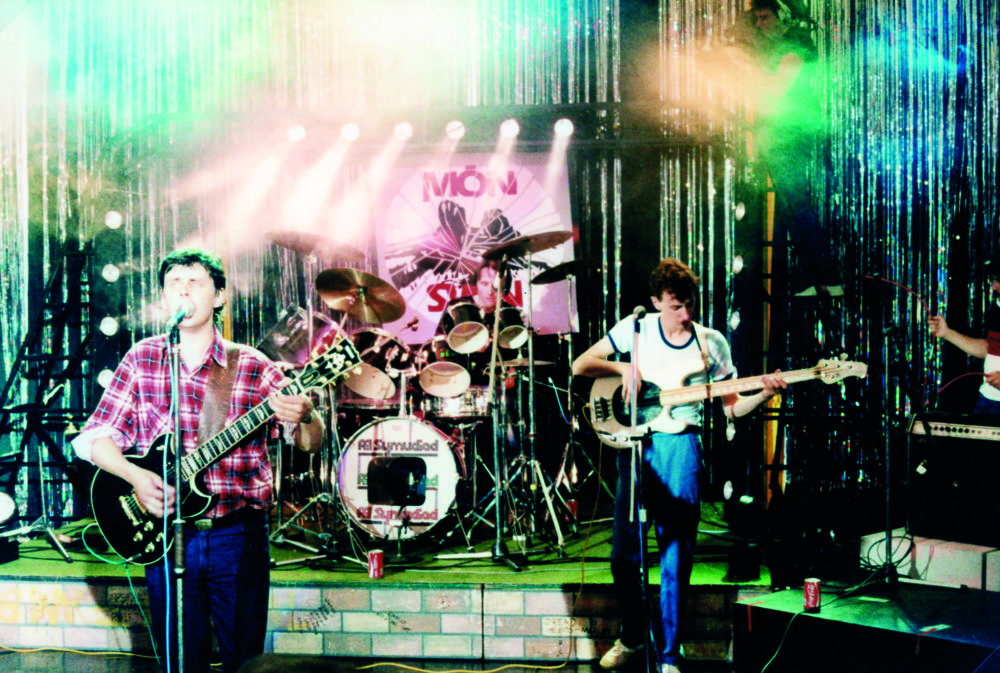
Locally they’ve given so many bands opportunities, and in doing so have become synonymous with culture, the Welsh language, and music in general in the south west and especially in Aberteifi.
Fflach Cymunedol feels like the natural progression of that initial ethos to do it their own way and that feeling of the need there has always been in the area for a central creative hub for artists and musicians.
I think Richard and Wyn would be really proud of the work we’re doing, and of the massive support we’ve found so far from locals, music fans and friends of theirs.
So how did you come to get involved in the company?
I feel very fortunate to have had this opportunity to move the company forward to the next level. We were moving back to the area just as the task ahead was materialising, with great help from a grant from Arfor.
But I have known the brothers my entire life, probably went to the studio first as a 10 year old, and have worked with Fflach in different capacities since I was a teenager recording the first single with my first band.
It’s been a personal pleasure to be able to carry on their work, and to try to understand what made Fflach special as we invite people on the journey with us.
With the sad loss of Richard and Wyn and the future of the company uncertain, it would be understandable if it had come to an end, what made everyone involved fight to keep it alive?
This debt goes to the family who, in their terrible grief, still found solace in knowing the difference their father and uncle made in the lives of so many.
Their determination to keep the legacy going but also their loyalty to the four decades of artists whose work Fflach’s publishing side looked after, lead them to the idea of transitioning to a community company.
The idea wasn’t around in 1981 when Fflach formed, but it’s very close to the ethos of how Richard and Wyn really ran their business, and so it felt like a perfect fit.
Can you tell us more about their vision…
The beautiful innocence of Richard and Wyn’s initial dream to form their own record label to promote bands they loved was something that never left them.
As the label grew and they built the studio, the focus was on creating great sounding records with mainly local talent with Wyn at the producing helm.
They had a sub-label in the 90s that worked with the rock bands emerging from the area, namely Dom and Jess.
Later they formed fflach:tradd, a sub-label for traditional music, with the emphasis on going into communities all over Wales and finding the real talent who hadn’t yet released or recorded.
They then formed RASP, another sub-label with a specific remit of giving early career opportunities to west Wales bands, mainly though EP releases at first.
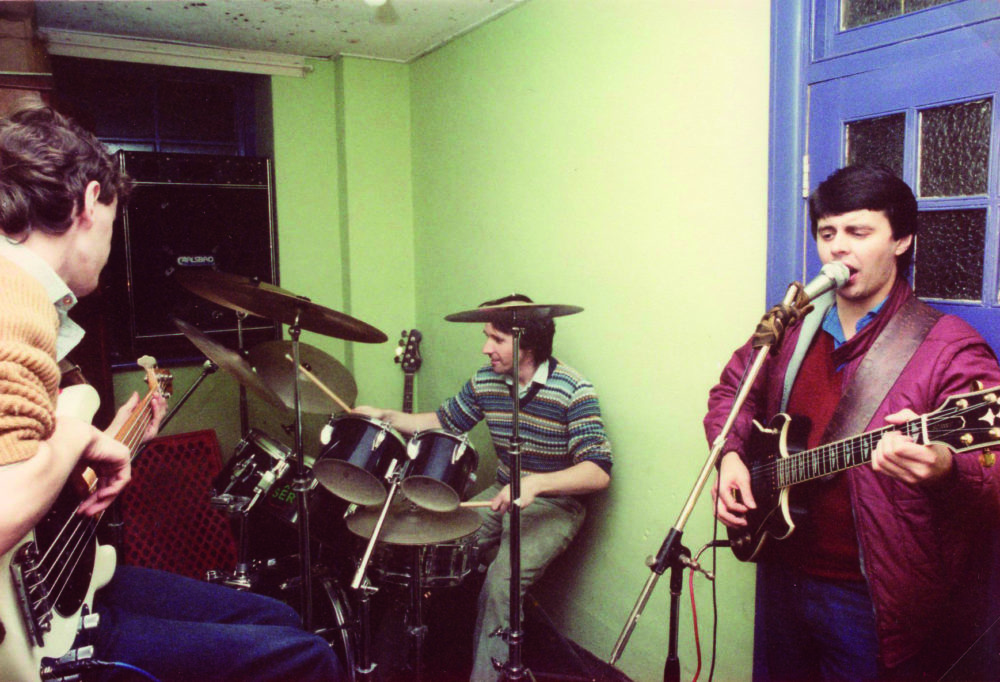
Mattoidz, Texas Radio Band and Swci Boscawen were early bands on the label, and it epitomised a particular explosion of bands and gigs all across south west Wales in the 2000s.
From all this we can extrapolate their intentions — to give bands and artists the opportunity to release music, and in doing so promoting the things they loved: music (of course), but the Welsh language, its culture, and their beloved Aberteifi.
Their history gives us a really clear map as to how our future as Fflach Cymunedol should look.
Tell us more about Fflach Cymunedol – what is it and how did the idea come alive to keep going in such an innovative way..
Fflach Cymunedol was initially an idea from a conversation between Richard and Wyn’s family and Cris Tomos, a local expert on community purchases, working at the time for PLANED.
That lead to a public meeting with interested parties, an initial grant from Cwmpas to get the idea off the ground and then a £30,000 grant from Arfor to convert the company and sell shares, whilst also promoting the new company.
Initially the idea was to move the studio to a new building, but with the huge overheads of owning or running a studio, we felt we should concentrate on the label and publishing side, to streamline the business, so that when the opportunity arose to build a new studio, we’d have the need for it through new bands and community work.
Luckily through the hard work and vision of other community organisations in Aberteifi, that plan seems to be going ahead and we hope to have a permanent home with a studio in the coming years.
There’s a real buzz in Cardigan at the moment with Other Voices and companies such as Hiut doing things their way. What is it about the town do you think?
I grew up around Aberteifi and the transformation in the last 20 years has been incredible.
The main reason is that the people who want change have a genuine love for the town, from theatre makers and musicians, to local community groups, to business owners and young people who decide to stick around.
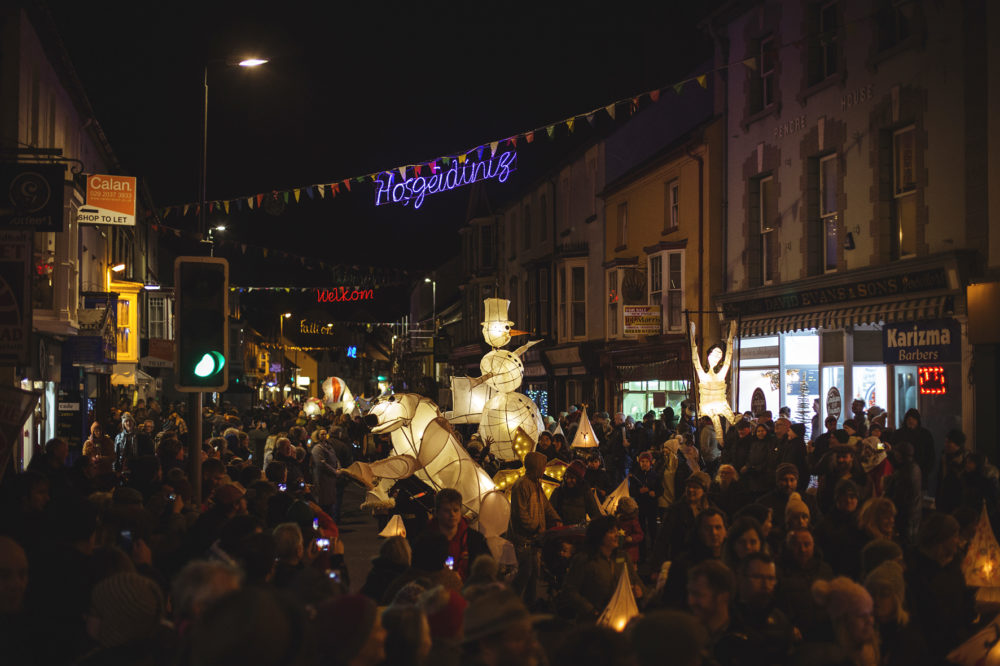
What the source for that love is, I’m not sure. It may be the Teifi’s rhythmic swelling as the tide changes, or its unique linguistic identity, as fluid as the river.
It’s lead to a wonderfully vibrant and busy town and we’re excited to be a part of it once again.
I’ve mentioned here many a time how arts in Wales (particularly music, cinema and poetry) inspired me to learn Welsh at school and then uni, then use it throughout my career.
I really *get* why this is so much more than a label, it’s sowing seeds isn’t it, growing future bands, future communities, keeping people in their communities and thriving in the Welsh language…
You’re damn right. Why stay in rural West Wales if there’s nothing to do? And why miss out on making great things because you’re living in a rural community?
This is obviously part of a wider movement to ensure we don’t end up with one cultural centre in Cardiff.
You see it in Swansea’s emergence as a music city, Carmarthen’s buzz around Cwrw, Machynlleth and mid-Wales’ exciting cultural community.
It’s the de-centralisation that has also lead to pubs being bought by the community, and in some sense to the emergence of Aberteifi as the bustling town it is — a sense that we on the edges deserve a good life too.
Our steps towards that will obviously include creative jobs, events, links with local business, but also direct work with the community through workshops, mentoring and work experience.
Music is everywhere, it’s an accessible form of artistic expression, which makes it the perfect tool for change-making.
Have you got any artists you’re currently working with, or some in mind?
When I began working on this project, my main aim was to find new bands. It felt like a much wealthier prospect for investors if they could see and hear what the future looked like.
There were a few barren years where the company had kept itself in line but hadn’t had the energy, or maybe the incentive, to release new music.
I found the first of our new artists working upstairs in Fflach’s office!
Mefin Hughes is a really talented musician who had just started working there a couple of days a week doing admin work. He was in a band that had self-released but were in a bit of a lull.
So we chatted over the coming months and he formed Lafant, a really exciting throwback to the energy of the 60s and the swagger of the 90s.
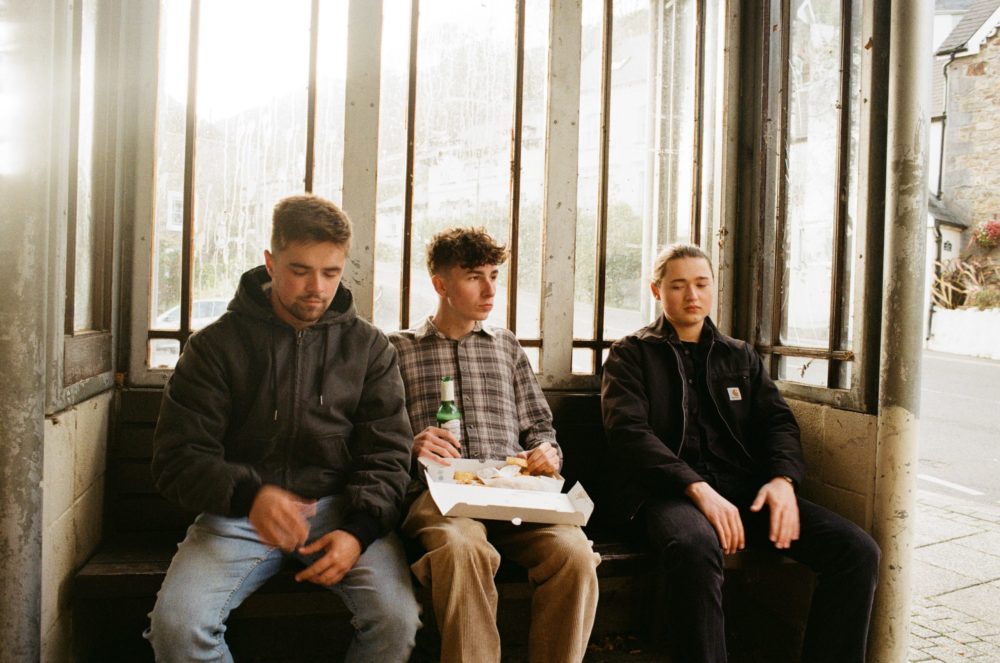
They’ve been slowly increasing their profile with a busy gig schedule, thanks in part to promoters like Andrew at Cwrw in Carmarthen and Steff Rees in Aberystwyth.
We’ve also been putting gigs on ourselves in the wonderful Seler in Aberteifi, partly as a platform for our new talent, but also to bring the best bands in Wales to the locals in Aberteifi.
We’re also working with Dewin, a “wizard-pop” band from the Preseli Hills who have been exciting people since their debut at the start of January, drawing comparisons to early Gorky’s; Chwaer who are a sister duo with immense vocal power and really poignant songs; and Mattoidz who have returned to the label after a three album hiatus.
They were the ones from the label who made it big when I was a teenager starting out in bands, so it’s been nice to work with them.
What’s amazing is that apart from Mattoidz who are ’seasoned’ musicians, the rest are all under 20 years old, with Chwaer’s youngest member still only 14.
These are just the bands currently in the studio, there are five or more we’re working with in some capacity with an eye on releasing singles with up-and-coming talent throughout the year.
And what of Fflach’s extensive back catalogue – as custodians of such a wealth of talent, and new platforms to share it with the world, do you have any plans to play around with this at all?
Fflach’s back catalogue is vast and varied.
There’s obviously all of Ail Symudiad’s work which we’re aiming to re-release to coincide with the Eisteddfod returning to the area in 2026.
There are local gems like Malcolm Neon and Jim’N’Ems, amazing rock bands like Catsgam and a folk masterpiece in the self-titled album by Cusan Tân.
In fflach:tradd’s archive you can find amazing proper folk like Rag Foundation, Sild, Ceri Rhys Matthews and Julie Murphy and all of Llio Rhydderch’s albums.
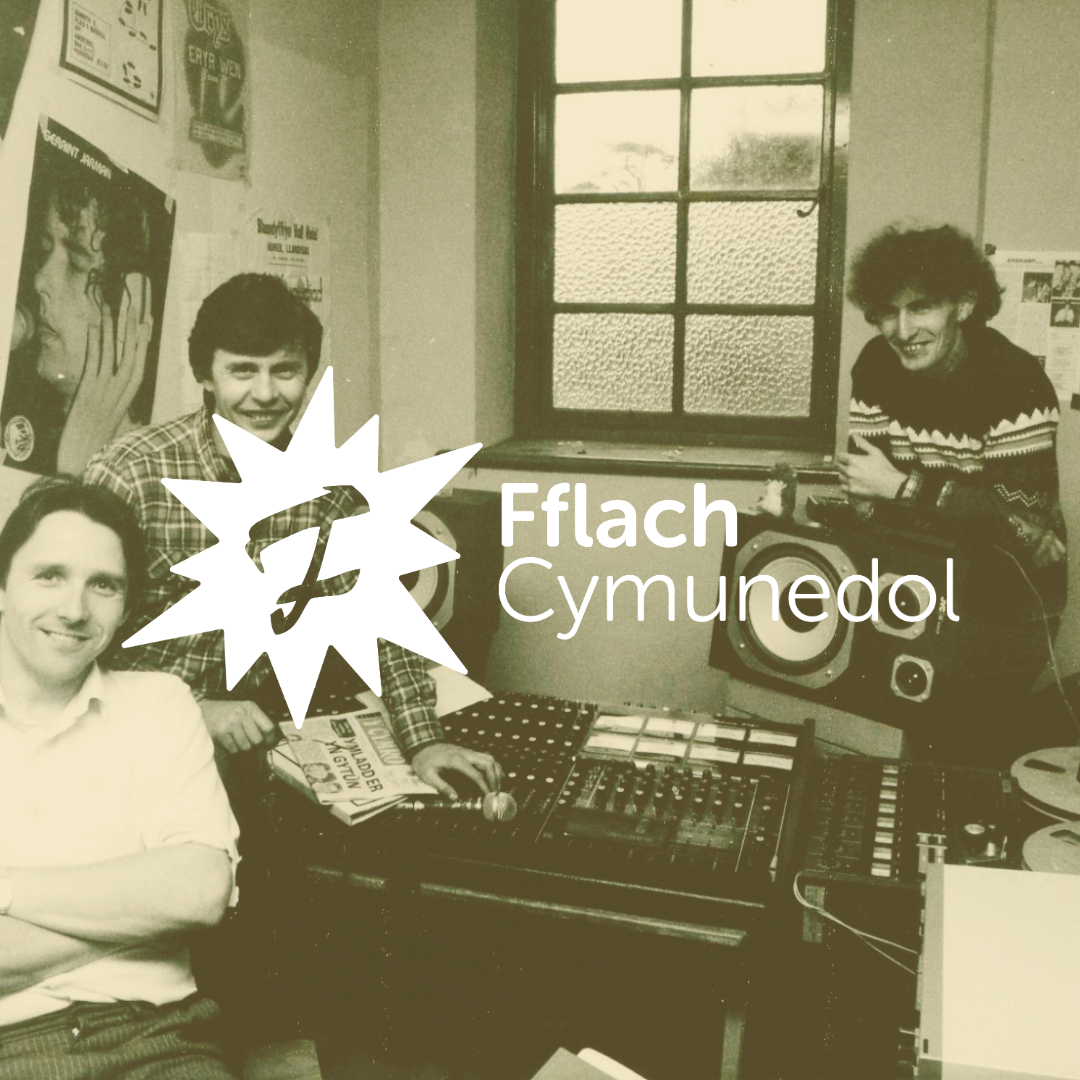
All of this is available digitally, but part of our work will be to ensure the cataloguing of these amazing works is tidied up and promoted.
We’re also aiming to release compilation albums using some of these tracks on vinyl and CD, as well as digitally.
We also have active talent like the singer-songwriter Einir Dafydd, who has released many beautiful albums with Fflach and is back gigging with the aim of recording in the near future.
The door is always open to these artists who have worked with Fflach to have a conversation with Fflach Cymunedol or to offer their support in any way.
I’ve never been so excited about Welsh language music as I am at the moment, it’s so fertile and innovative, and particularly young artists are making music I’m genuinely moved by and listening to again and again.
You’ve really chosen a good time to capture that, especially since so many are claiming a place on the world stage.
For me, we’ve been in an interesting place where we’ve been looking outwards for the first time since the 90s.
There are Welsh language gigs being put on in London, Leeds, in north America and Europe.
Alffa are huge in Brazil (deservedly), Adwaith play festivals in the Netherlands and Italy.
The net effect of these gains though has meant that there’s been a void of gigs, especially outside of the metropolitan areas.
It’s also meant that new bands and artists need to explode onto the scene (and on social media in truth) already fully formed, which is very hard, and can be off-putting for young talent.
You only have to look at the work of Cwrw in Carmarthen though to see the next wave in reaction to this. They’ve poured their souls into ensuring there’s a platform to Wales-based and Welsh language bands, often side-by-side with bands from elsewhere. The grass roots is vital.
And when you live on the edge of things like we do in Aberteifi, grass roots doesn’t mean a venue of 500, it’s a venue of 50.
I feel like there’s been a genuine shift in the last 2 years. Maybe we were still reeling a little from Covid, but there were very few new bands coming through — I’m talking mainly about Welsh language bands now — but there now seem to be school bands and new songwriters popping up everywhere.
You’ve got people maybe being fed up of Welsh music being a darling of the media, and wanting it shifted back to pubs and front rooms.
You obviously need both ends of the scale, and everything in-between, but I feel genuinely excited about things right now for the first time in a while!
So can you tell me more about the enterprise, and the community ownership element?
Fflach Cymunedol is a community benefit society, which means that people can buy shares to be a member of the society, and be able to have a say in how the company is run.
Unlike the purchase of a pub or building for the community, because Richard and Wyn’s family have been involved in the discussion throughout, we decided to convert the company, as opposed to asking the community to raise funds to buy it.
Their generosity means that the shares raised can go towards actually doing the work of the label, without the need to buy the company.
We’re looking to raise a minimum of £50,000, which would allow us to realise our targets in the coming years.
What these are can be seen in our prospectus on fflach.cymru but generally it’s releasing and mentoring, community work, the running of the publishing side, and beginning the work of archiving and exhibiting Richard and Wyn’s work.
The maximum we can raise is £100,000.

The nitty-gritty is that a share is worth £1 but to be a member you have to buy at least 50 shares (and at most 20,000), so in real terms, as little as £50 will make you a member and give you an equal voice with any other shareholder, regardless of their investment.
We’ll appoint a new board from those members who have stated their interest. We’re a community enterprise and will therefore be free to look for grants accordingly.
This will form a large part of our work, either through creative projects or with community engagement work. The window for investing was opened on December 16, and closes on February 17.
We’ve raised £10,000 on the day of writing, which is 20% of our total, so there’s plenty of work to be done to raise the remaining money, but every conversation on the project has been positive so we’re hopeful of reaching our target.
And how can we all play a part, and perhaps importantly for ‘investors’ – what’s in it for them? 😀
People can invest for as little as £50 by going to our website fflach.cymru and filling out a very simple form.
If they’re local to Aberteifi, they can pick up a physical copy from Awen Teifi or Castle Cafe. Unlike a crowdfunding campaign we’re not offering short term returns.
They may get some free merchandise or access to music or gigs in the future, but this is a long-term investment in the company’s future. It’s also unlike a community lead purchase of a pub, in that you’re not investing in bricks and mortar.
It’s an investment in talent, in opportunity, in curbing the trend of the exodus of young people from West Wales.
It’s also an investment in Richard and Wyn, in Ail Symudiad and that era of opportunity that those trailblazing bands manufactured for themselves.
This is us as a community taking control of an institution that has meant a lot to many people, and ensuring it has a future.
That community is vast and has different drivers. For some it’s Aberteifi that draws them in, for others Richard and Wyn.
For some it’s the excitement of new music, for others the grounding feeling of investing in community.
So what’s in it for them? Being a part of this radical new idea, and helping us in the journey to making Fflach Cymunedol another success story.
Support our Nation today
For the price of a cup of coffee a month you can help us create an independent, not-for-profit, national news service for the people of Wales, by the people of Wales.






Rich and Wyn did so much for Aberteifi, and Richard’s son is once again putting the town back on the map. So many artists owe them a great deal—Wyn was such a humble man, and Richard was never one to boast.
One small request for Crwst: could their social media posts be bilingual? I’m sure Richard wouldn’t approve of English-only posts. With tools like ChatGPT, it takes just seconds to translate into Cymraeg.